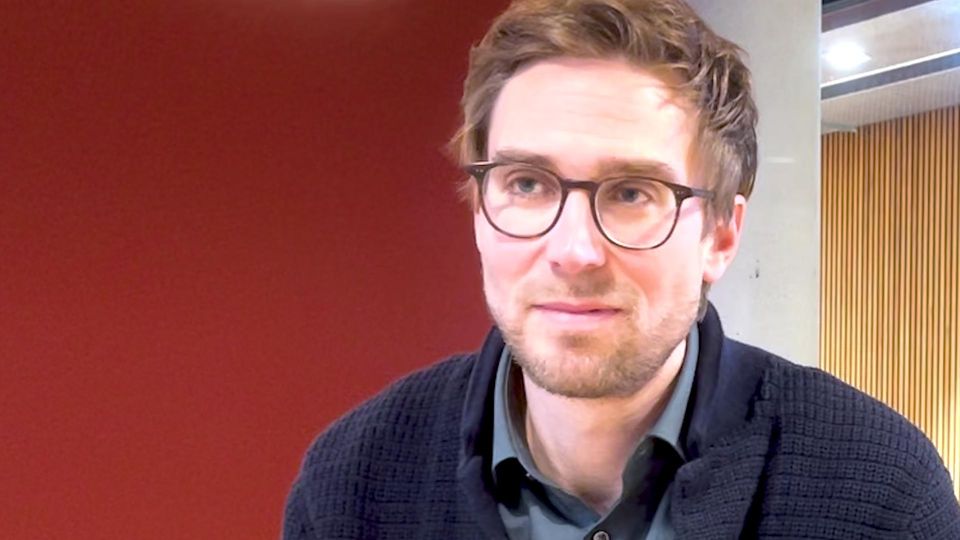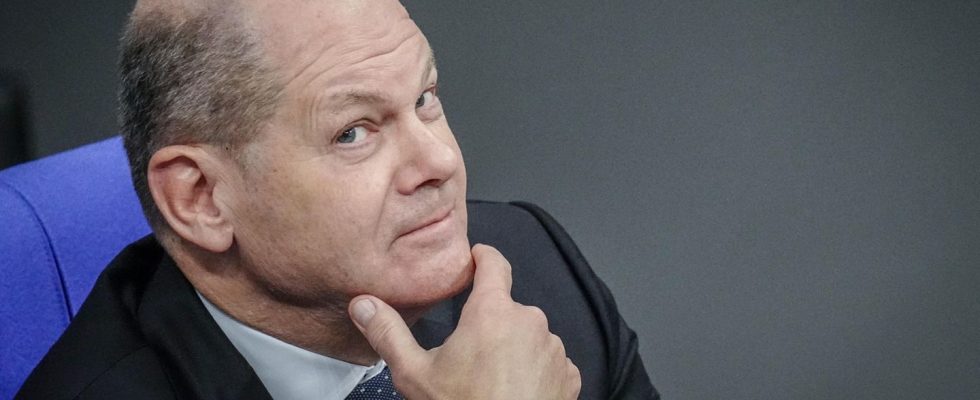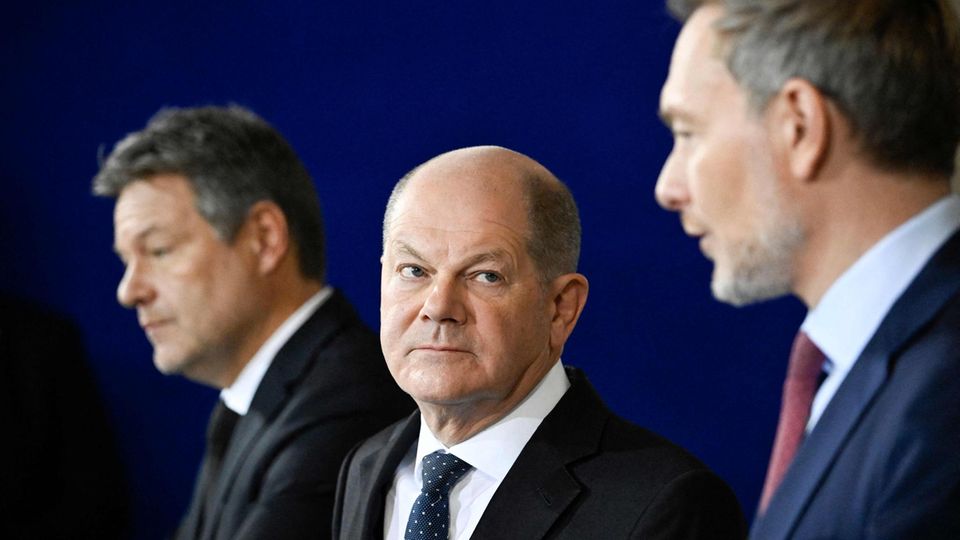Finally white smoke! The Chancellor and his two most important ministers publicly assert that they have reached an agreement in the budget dispute. In many areas it is still completely unclear what will happen next.
Two days have passed since the three traffic light men appeared before the public in the Chancellery to announce: The budget for 2024 is in place – stable, elegant and constitutional. Budget crisis? Completed!
But is that even true?
Two days later, there are still more questions unanswered than answered. Two days later, the joint appearance by Chancellor Olaf Scholz, Economics Minister Robert Habeck and Finance Minister Christian Lindner can be viewed quite differently: as a bold statement, if not a major bluff.
There were three traffic light men who claimed to have managed to square the circle. They claimed that they would plug all budget holes and leave no one alone in their time of need, neither citizens nor the economy, and especially not Ukraine. To make matters worse, they claimed that they would of course comply with the debt brake. And if not? Something about “exceeding resolution”.
But the public is still left to wonder what the Chancellor, Vice President and Deputy Vice President really agreed to during their long night. The coalition has not yet presented a detailed plan, or at least a clear concept. After the endlessly long coalition committee nights, there has so far been at least one joint paper that outlines the agreement. It’s different this time: the three-way round itself left nothing in writing. Apart from a few so-called argumentative aids, hastily drawn up in party headquarters and the ministries involved, there is no known common decision paper. A number here, a goal there, a definitive plan nowhere.
Curtain closed, all questions unanswered? The problem is most evident in the following five points:
Emergency – what again?
It starts with the very basics, with the question of whether the debt brake will be adhered to or relaxed in an emergency – but really only in an emergency and exclusively to support Ukraine. Or what was that exactly like? It is certainly not by chance that Olaf Scholz avoided the catchy word “budget emergency” and instead chose the cumbersome technocratic term “exceeding resolution”. Of course, the matter would remain the same: the government declares an emergency, which enables it to take out more loans than the debt brake actually allows.
For Scholz, this case occurs when the situation on the Ukrainian-Russian front deteriorates dramatically. Or if the US decides to stop supporting Ukraine. Apparently the Chancellor is prepared to massively increase German payments in this situation. Whether this is legally tenable would certainly be decided again by the Federal Constitutional Court. Another question is just as exciting: whether the coalition partners share the Chancellor’s assessment. That will become apparent when the moment comes.
The brake applies until revoked, which a leading Social Democrat called a purely “performative gain” for FDP leader Lindner. Loosely translated, this means: It may look like a victory for Lindner at the moment, but sooner or later we will declare the budget emergency anyway. Or not? The coalition partners have postponed the decision on this question until the future – as has the dispute about it.
Flood relief for the Ahr Valley: a test order – and test balloon?
When it came to financial aid for the flood victims in the Ahr Valley, the coalition members were only able to agree to postpone their dispute – they did not reach an agreement on the matter. The controversial question: Should 2.7 billion euros be raised to deal with the flood disaster of 2021 through a new emergency resolution, i.e. by easing the debt brake?
Chancellor Scholz and his SPD are aiming for this, Finance Minister Lindner and his FDP are at least skeptical about the plan. The formula compromise is now: The project will first be examined and the extent to which an “exceeding decision” is constitutionally possible will be examined. They obviously want to avoid repeated claps from Karlsruhe. This is probably one of the reasons why discussions should be sought in parallel with the Union as to whether it would support such a decision – or whether it would go to the Constitutional Court again.
Compared to the total volume of the 2024 budget (more than 450 billion euros), the flood aid represents a small amount that could probably be covered from the core budget. The suspicion is therefore that Scholz wants to set an example: by providing the Ahrtal aid via an “exceeding resolution”, the Chancellor could prove that a well-founded emergency can still be made. After the coalition partners reached an agreement, Scholz pointedly pointed out that the Basic Law “expressly” provides that credit limits could be raised to deal with natural disasters and extraordinary emergency situations. So so.
Flying is becoming more expensive – all clear? Not at all.
Flying within Germany is set to become more expensive. As part of the budget compromise, the federal government apparently plans to eliminate subsidies in national air transport. So everything is clear? Not at all. There seems to be no agreement among the coalition members on exactly how the subsidies should be eliminated.
Robert Habeck’s Economics Ministry says the government wants to introduce a kerosene tax. This has long been a concern of the Greens, and national air traffic has so far been exempt from it. The industry was immediately horrified: “The state location costs in Germany are already the highest in a European comparison,” said Jost Lammers, President of the Federal Association of the German Aviation Industry. “In this situation, the federal government is making feeder traffic to German hubs more expensive by going it alone nationally to tax kerosene within Germany and thus shifting traffic to other European and international countries.”
But is that even true? In Lindner’s finance ministry, people are thinking about a different mechanism: the aviation tax. Companies have to pay this per passenger for each flight. At the moment, the tax is linked to the income from emissions trading. The higher the latter, the lower the tax rate. In the future, this reduction mechanism will no longer apply, according to a paper from the ministry on budget agreement. The Federal Audit Office has already recommended its abolition in the past. Because the reduction causes reduced tax revenue for the budget and contradicts “climate policy steering goals”. How does it happen in the end? This still seems completely open at the moment.
Investments in the railway infrastructure – where exactly from?
It is one of the government’s few clear announcements: The 12.5 billion euros that were earmarked for the restructuring of Deutsche Bahn in the climate and transformation fund will no longer apply. They should be compensated for somehow. The plan is to start the general renovation of the network next year: 4,000 kilometers of rail must be modernized by 2030. Unfortunately, it is currently anything but clear as to exactly which detours the intended money will be mobilized.
There are whispers from the government, hints, scenarios. Federal holdings are supposedly to be sold. Shares in the post office or Telekom, for example, could provide the necessary billions. But to what extent? When? And what exactly could be affected? Everything open. Selling your own silverware is always a sensitive matter. What’s gone is gone. The public silence of the ministries involved may also be due to concerns about making strategic mistakes.
The railway’s logistics subsidiary, Schenker, could also reportedly be sold. An investor from the Emirates is already interested in taking over, it is said. Not everyone in the coalition is convinced of this. Schenker is profitable. If the company were to be sold, it would leave a hole in the railway’s balance sheet that would immediately swallow up the billions gained, at least more or less. A zero-sum game, some critics fear. And so, on the very important topic of network renovation, there is still a lot of scope for speculation and negotiation as to whether and where the billions should now be raised. Only one thing is clear: the disastrous unpunctuality of the train must come to an end.
Little cuts – lots of air bookings: The thing with citizens’ money
What is also currently unclear is how the traffic light plans to cut the social sector, the largest individual household. Or as Christian Lindner put it: “The welfare state must be made more targeted.” Savings of around 1.5 billion euros have been announced in the coming year. This sum should be achieved on the one hand by canceling the citizen’s money bonus. The bonus was only introduced in the summer: those receiving basic income receive an extra 75 euros per month for further vocational training that is not aimed at obtaining a professional qualification and lasts at least eight weeks. This will no longer happen next year. So far, so clear. But what about further training courses aimed at obtaining a professional qualification? There is even a subsidy of 150 euros for them. It is still unclear whether this will also be deleted.
The planned second measure becomes even vaguer. By placing more Ukrainian refugees into work, significant savings will be made on citizens’ money. Around 700,000 refugees from Ukraine are currently receiving citizen’s benefit in Germany, a total of around seven billion euros per year. Only around 20 percent of all employable refugees actually go to work. In other European countries the proportion is sometimes twice as high.

The simple calculation: More refugees in work means less spending on citizens’ money. But how? There is talk of a “tightening of sanctions”. However, the Federal Constitutional Court already set strict limits on the amount of benefit cuts in 2019. In the event of repeated “breach of duty”, such as failing to show up for an appointment, the basic security can be reduced by a maximum of 30 percent. Apparently, the main aim is to increase psychological pressure, for example through a higher “contact density”, as it is called in technical jargon. This means that Ukrainian citizens’ benefit recipients should be called to the job center at short intervals in the future. How the job centers are supposed to do this given the shortage of staff there remains a mystery at the moment.
What’s next? There will be an expert hearing in the Bundestag on January 11, 2024, and the budget committee’s adjustment meeting could take place on January 18, according to budget circles. The 2024 budget could therefore go into the second and third reading on January 29th and be finalized in the Bundestag and Bundesrat on February 2nd. Status: now. A tight program – and yet plenty of time for the traffic light parties to get into a lot of trouble over the many open details.


